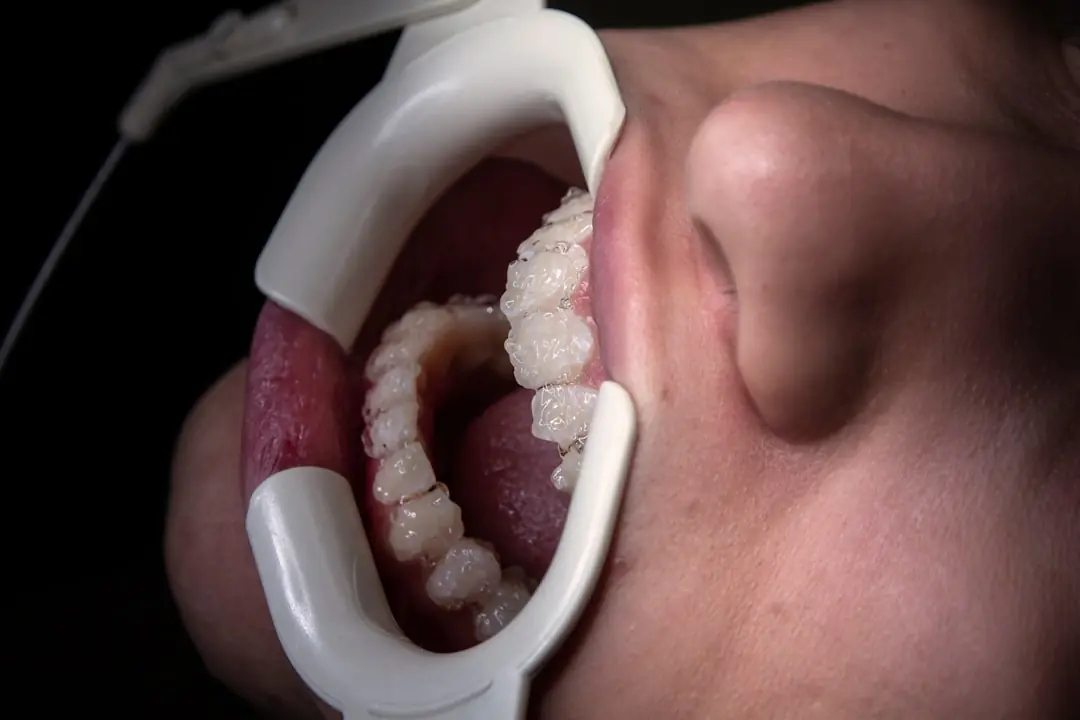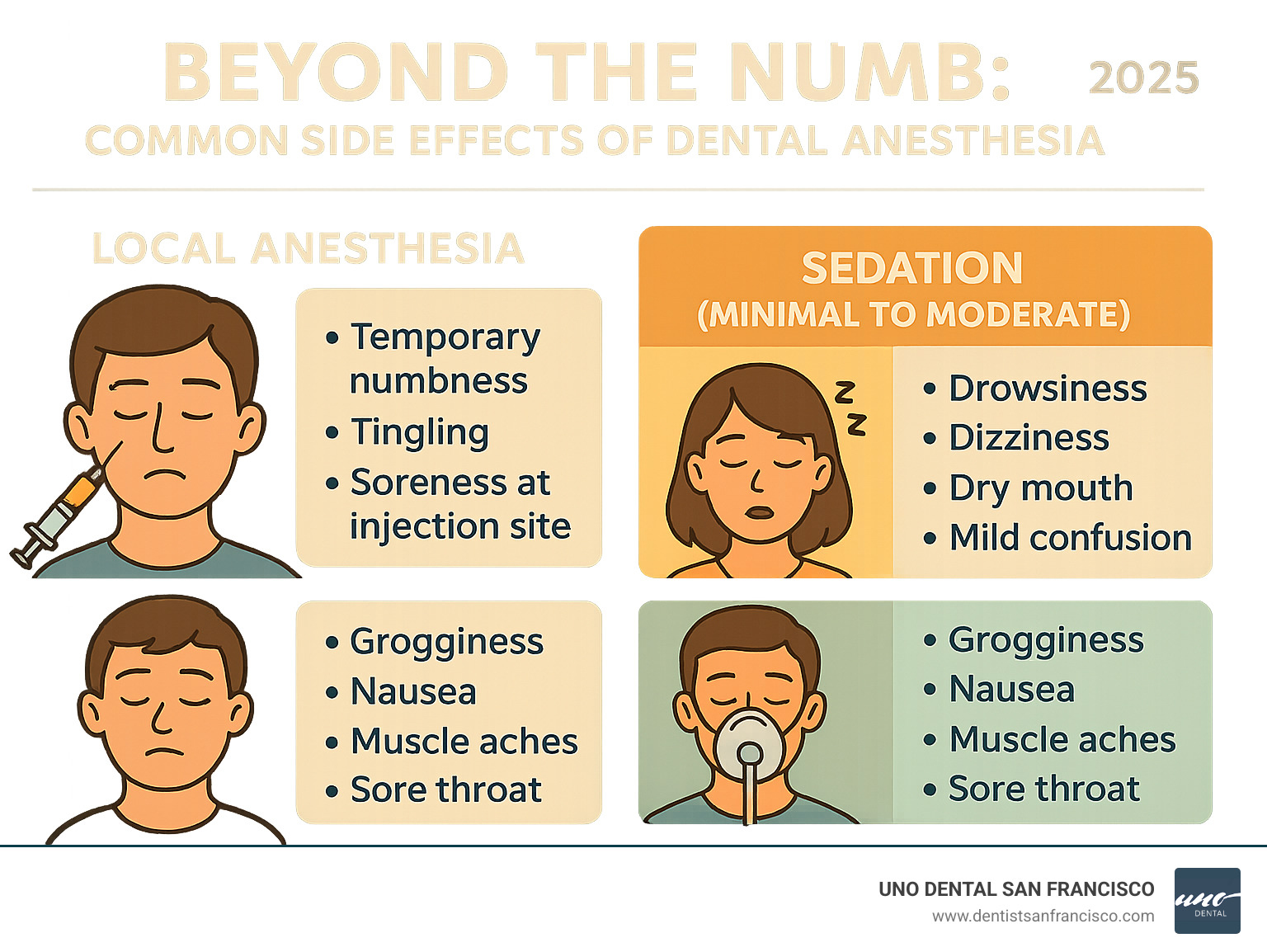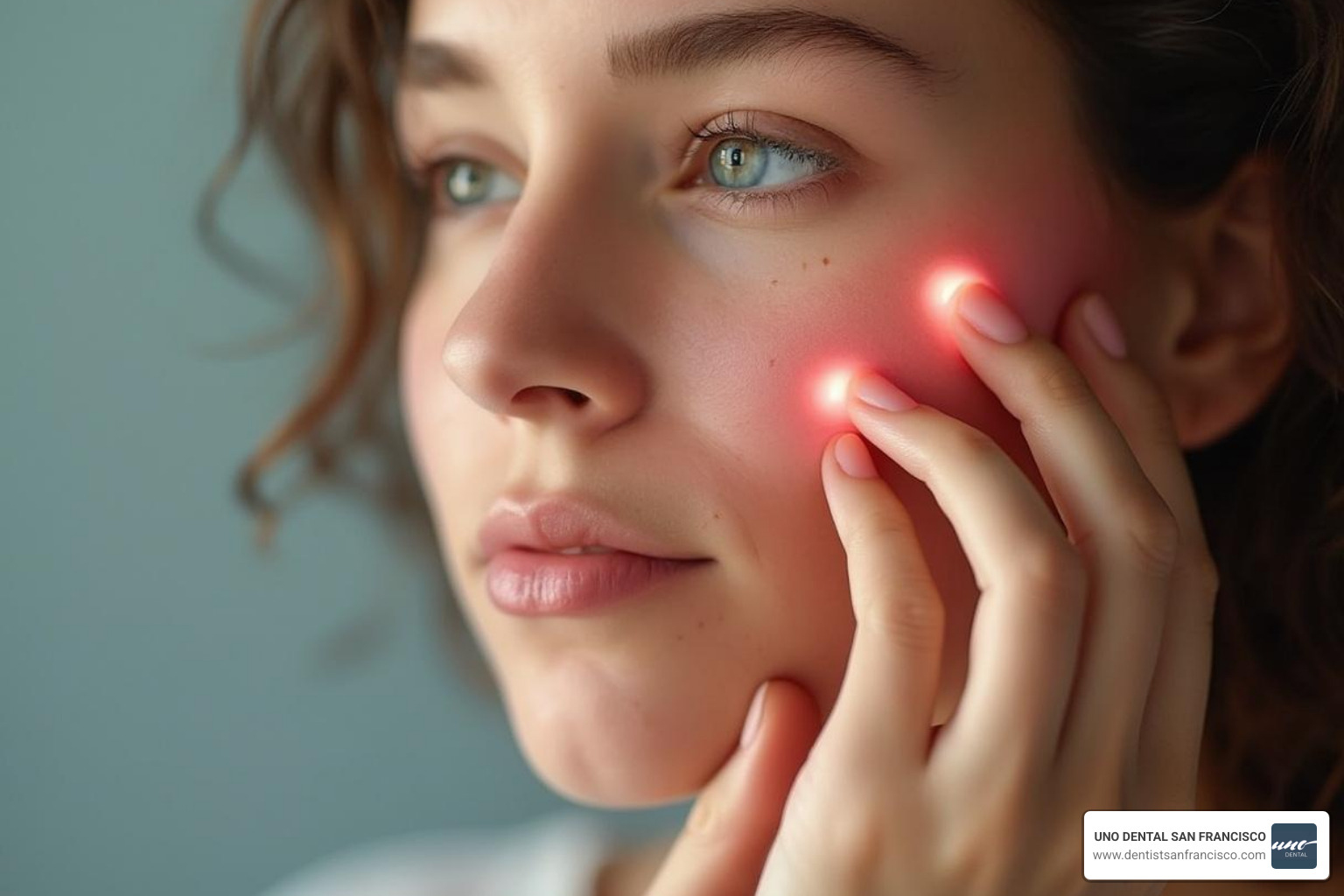
Navigating Dental Anesthesia: Your Guide to Side Effects
When you're facing a dental procedure, it's natural to have questions, especially about how you'll feel. Dental anesthesia is designed to make your experience pain-free and comfortable. While it's very safe, knowing about potential dental anesthesia side effects can help you feel more prepared.
Here are the most common side effects you might experience, depending on the type of anesthesia:
- Local Anesthesia: Temporary numbness, tingling, soreness at the injection site, and sometimes a temporary racing heartbeat.
- Sedation (Minimal to Moderate): Drowsiness, dizziness, dry mouth, and mild confusion.
- General Anesthesia: Grogginess, nausea, muscle aches, and a sore throat.
Going to the dentist can feel a bit uncomfortable for many people. Dental anxiety is common, and that's why anesthesia is a vital part of modern dental care. It ensures you don't feel pain during procedures, making your visit much more comfortable. While dental anesthesia is incredibly safe and effective, understanding potential side effects is important. This guide will walk you through what to expect, helping you feel more prepared and in control.
As Dr. Mohammad Aghiad Kandar, I've spent over 15 years helping patients steer their dental care, including understanding and managing dental anesthesia side effects. My goal is always to provide comfortable, compassionate care.
Find more about dental anesthesia side effects:
Understanding the Types of Dental Anesthesia
To ensure your visit is pain-free, we tailor your anesthesia to your specific procedure, medical history, and comfort level. Before discussing potential dental anesthesia side effects, let's explore the main types we use at UNO DENTAL SAN FRANCISCO.
Local Anesthesia
Local anesthesia is the most common type, numbing a small, specific area of your mouth for procedures like fillings or root canals. You remain fully awake and aware. We typically apply a topical anesthetic gel first to numb the surface, making the injectable anesthetic more comfortable. The medicine, often Lidocaine or Articaine, works by blocking pain signals from reaching your brain. It takes effect within 10 minutes and provides comfort for 30 to 60 minutes, though the numbness can linger. It's our go-to for keeping you pain-free without drowsiness.
For more details, the American Dental Association's MouthHealthy page offers insights on anesthesia and sedation.
Regional Anesthesia
For procedures affecting a larger area, we may use regional anesthesia, also known as a nerve block. Instead of numbing a single tooth, this technique numbs an entire region of your mouth, like one side of your lower jaw. A common example is the inferior alveolar nerve block (IANB), used for wisdom tooth removal or other oral surgeries requiring a broader numbing effect.
Sedation
For patients with dental anxiety, we offer various levels of sedation to help you relax. In most cases, you remain conscious and able to respond but will feel calm and at ease.
- Minimal Sedation: Often called laughing gas, this involves breathing a nitrous oxide and oxygen mixture through a mask. You'll feel relaxed, and the effects wear off quickly, so you can usually drive home.
- Moderate Sedation: This can be a pill taken before your appointment or administered via IV. You'll feel very sleepy and may not remember much of the procedure afterward.
- Deep Sedation: Given through an IV, this puts you on the edge of consciousness. You'll be deeply relaxed but can still be awakened if necessary.
Sedation can transform the dental experience. The American Association of Oral and Maxillofacial Surgeons provides a guide on sedation options.
General Anesthesia
For the most complex or lengthy procedures, such as extensive implant placements or corrective jaw surgery, we use general anesthesia. This puts you in a state of being completely unconscious. Your vital signs are continuously monitored by an anesthesiologist or a highly trained oral surgeon to ensure your absolute safety. At UNO DENTAL SAN FRANCISCO, we partner with qualified anesthesiologists to provide this high level of care for extensive treatments.
A Guide to Dental Anesthesia Side Effects
Dental anesthesia is very safe, and most dental anesthesia side effects are mild and temporary. Here’s a breakdown of what you might experience based on the type of anesthesia you receive.
Common Side Effects of Local Anesthesia
Side effects from local anesthesia are generally localized and short-lived.
- Temporary Numbness and Tingling: The intended effect, this numbness in your tooth, gum, lip, or cheek can last for a few hours.
- Difficulty Speaking or Smiling: Numbness can temporarily affect muscle control, leading to a lopsided smile or a droopy eyelid or lip. This is normal and resolves as the anesthetic wears off.
- Swollen Feeling: The numb area may feel swollen, even without visible swelling.
- Soreness or Bruising: You might have some soreness or a small bruise (hematoma) at the injection site.
- Racing Heartbeat or Dizziness: The vasoconstrictor (like epinephrine) added to many anesthetics can cause a brief, harmless racing heart. Some people may also feel dizzy, especially if they stand up too quickly.
Common Side Effects of Sedation
Sedation is designed to help you relax, but it comes with a few common side effects.
- Drowsiness and Dizziness: You will feel sleepy after oral or IV sedation, so you'll need someone to drive you home.
- Headache: A mild headache can sometimes occur, especially after nitrous oxide.
- Nausea or Vomiting: This is less common but can happen, particularly if pre-procedure fasting instructions weren't followed.
- Dry Mouth: Sedation can reduce saliva flow, but sipping water helps.
- Amnesia: A common benefit of moderate or deep sedation is having little to no memory of the procedure.
- Chills and Confusion: You might feel cold or have temporary "fuzzy thinking" as the sedation wears off.
Common Side Effects of General Anesthesia
General anesthesia is a deeper form of sedation with its own set of expected post-procedure effects.
- Grogginess and Confusion: Waking up can be disorienting, and you'll likely feel very sleepy for several hours.
- Shivering: It's common to feel cold and shiver as your body temperature readjusts.
- Sore Throat: If a breathing tube was used, you might have a mild sore throat or hoarseness for a day or two.
- Nausea and Vomiting: Though less frequent with modern medications, this can still occur.
- Muscle Aches: Lying still for a long procedure can cause some stiffness.
- Postoperative Cognitive Dysfunction (POCD): In rare cases, usually in older adults, temporary confusion or memory issues can occur.
- Itching or Bladder Issues: Some medications can cause mild itching as they wear off, and rarely, temporary difficulty urinating can occur.
Rare Complications and Risk Factors
While serious complications are rare, it's important to be aware of the risks associated with dental anesthesia. Open communication about your health history is the best way to ensure your safety.
Nerve Damage (Paresthesia)
In very rare cases, an injection needle can irritate a nerve, causing paresthesia—prolonged numbness, tingling, or a burning sensation. The lingual nerve (tongue) and the inferior alveolar nerve (lower lip and chin) are most commonly affected. Permanent nerve damage is exceedingly rare (fewer than 3 in 100,000 procedures), and most cases of paresthesia resolve on their own within 8 weeks. We use precise injection techniques to minimize this risk, as confirmed by resources like the American Society of Regional Anesthesia on the risks and benefits of nerve blocks.
Allergic Reactions
True allergic reactions to modern anesthetics are extremely rare (affecting less than 1% of patients). Often, symptoms are related to anxiety or a normal response to epinephrine. A genuine reaction can range from a mild rash or hives to a severe, life-threatening reaction called anaphylaxis. This is why disclosing all allergies is critical. If you have a known allergy to anesthetics or preservatives like bisulfites, we will use a safe alternative.
Other Potential Risks
Several factors can influence your response to anesthesia.
- Systemic Toxicity: This can occur if anesthetic enters a blood vessel, causing a racing heartbeat, dizziness, or a metallic taste. We prevent this by using careful injection techniques and calculating the proper dosage.
- Age: Older adults and very young children may be more sensitive to anesthesia and require special dosing and monitoring.
- Pre-existing Conditions: Health issues like heart disease, high blood pressure, asthma, sleep apnea, or liver and kidney disease can increase risks.
- Medications: All medications, supplements, and over-the-counter drugs can potentially interact with anesthetics. For example, blood thinners increase bruising risk, and some anxiety medications can intensify sedation.
- Lifestyle: Smoking, heavy alcohol use, and high anxiety levels can affect how your body responds to anesthesia and recovery.
Reviewing your complete medical history is a key part of our holistic approach at UNO DENTAL SAN FRANCISCO, ensuring we create the safest treatment plan for you.
Patient Safety: Before and After Your Procedure
Your safety is our top priority at UNO DENTAL SAN FRANCISCO. Following these guidelines before and after your procedure helps minimize dental anesthesia side effects and ensures a smooth experience.
Before Receiving Anesthesia
Proper preparation is key to a safe procedure.
- Disclose your full medical history: Be open about all past and present health conditions, surgeries, and illnesses.
- Provide a list of all medications: Include prescriptions, over-the-counter drugs, vitamins, and herbal supplements.
- Discuss any allergies: Inform us of any known allergies to medications, latex, dyes, or other substances.
- Follow pre-procedure instructions: For some types of anesthesia, you may need to fast (avoid food and drink). Following these rules is vital for your safety.
- Arrange for a ride home: If you are receiving sedation or general anesthesia, you must have a responsible adult drive you home and stay with you for a few hours.
After Receiving Anesthesia
Proper aftercare promotes quick and comfortable healing.
- Avoid chewing on the numb area: Wait until full feeling returns before eating to prevent accidentally biting your cheek, lip, or tongue.
- Stick to soft foods: Once the numbness is gone, eat soft foods for a while to avoid irritating the treatment area.
- Rest and recover: Take it easy for the rest of the day, especially after sedation. Avoid strenuous activity.
- Follow your aftercare plan: We will provide specific instructions for pain management and oral hygiene.
- Stay hydrated: Sip water to combat dry mouth, a common side effect of sedation.
When to Call Your Dentist About Dental Anesthesia Side Effects
Most side effects are mild, but please contact us at UNO DENTAL SAN FRANCISCO if you experience any of the following:
- Signs of an Allergic Reaction: Widespread rash, hives, significant swelling (especially of the face or throat), or difficulty breathing require immediate medical attention.
- Numbness that Lasts More Than 8-10 Hours: If numbness persists well beyond the expected timeframe, please call us.
- Severe or Increasing Pain: Pain that is not managed by medication or gets worse needs our attention.
- Fever or Swelling: A fever or significant swelling could indicate an infection.
- Persistent Dizziness or Confusion: If grogginess or confusion doesn't improve or is severe, let us know.
- Vision Changes: Report any temporary blurred or double vision immediately.
Frequently Asked Questions about Dental Anesthesia Side Effects
Here are answers to some common questions we hear from patients about dental anesthesia side effects.
How long does the numbness from dental anesthesia last?
Numbness from local anesthesia typically lasts 2 to 5 hours. The exact duration depends on several factors: the type of anesthetic used, your individual metabolism, and whether a vasoconstrictor (like epinephrine) was included to prolong the effect. It's normal to feel some residual tingling as the sensation returns.
Is it normal to feel shaky or have a racing heart after a dental injection?
Yes, this is a common and usually harmless reaction. It can be caused by two things:
- Epinephrine: This ingredient is often added to local anesthetic to make it last longer. As a form of adrenaline, it can cause a temporary, brief feeling of a racing heart or jitters, similar to drinking a strong coffee.
- Anxiety: Feeling nervous about an injection can trigger your body's natural stress response, releasing your own adrenaline and causing the same symptoms.
If you feel this way, let us know. Simply understanding the cause can often help you feel calmer.
Can you be allergic to dental anesthesia?
True allergies to modern local anesthetics (like Lidocaine) are extremely rare, affecting less than 1% of people. What is often mistaken for an allergic reaction is usually:
- A reaction to preservatives: Some people are sensitive to bisulfite preservatives found in anesthetics containing epinephrine. We have preservative-free options available.
- Anxiety: Fear can cause symptoms like lightheadedness or sweating that mimic an allergic reaction.
- A side effect of epinephrine: The racing heart and shakiness are expected side effects, not an allergy.
It's crucial to tell us about any past adverse reactions. We will carefully review your history to select the safest anesthetic for you, ensuring your peace of mind at UNO DENTAL SAN FRANCISCO.
Conclusion
We hope this guide has helped explain dental anesthesia and its potential dental anesthesia side effects, making you feel more informed and at ease. Modern dental anesthesia is remarkably safe and effective, and most side effects are minor and temporary. Serious complications are exceedingly rare, especially with a meticulous dental team.
At UNO DENTAL SAN FRANCISCO, your safety and comfort are our guiding principles. Open communication about your health history, medications, and any concerns is the key to a worry-free experience. Our holistic approach means we tailor every aspect of your treatment, including anesthesia, to your unique needs. We combine high-tech dentistry with a focus on your overall well-being to deliver comfortable, pain-free care.
We are here to support you on your journey to optimal oral health. Please don't hesitate to reach out with any questions.
To learn more about our patient-centered approach, we invite you to explore our comprehensive dental services or inquire about our free virtual smile consultations.


